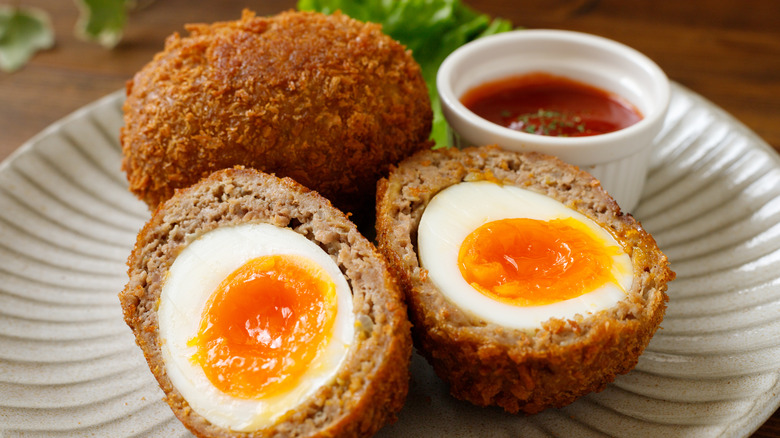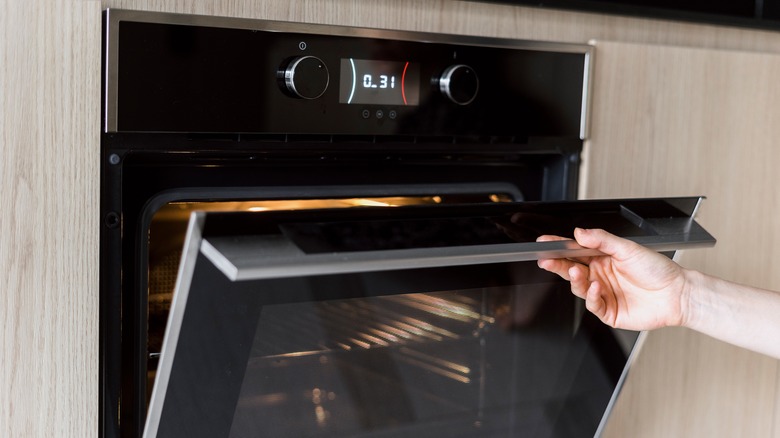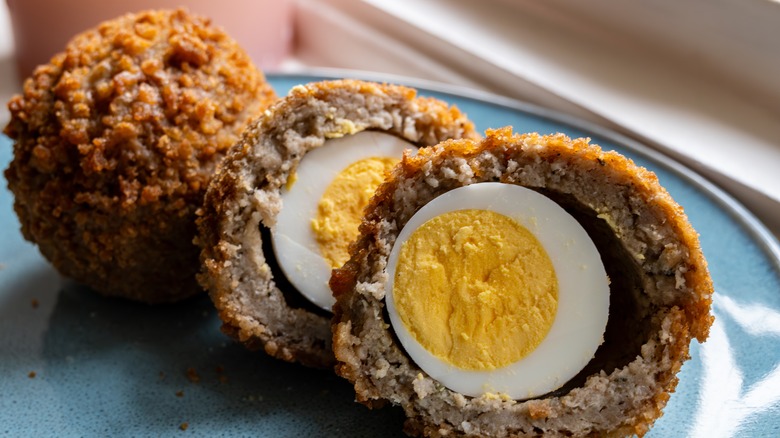Simplify Scotch Eggs By Baking Them
If you're wondering what exactly is a scotch egg, you're not alone. Most recipes in cookbooks and across the internet recommend deep frying this sausage-stuffed, bread-coated egg dish. And we get why — frying has a way of producing some of the most delicious crisp-tender bites in the culinary world. However, it's not the only way to prepare scotch eggs. It's not even the most efficient method (yes, it does take just a few minutes, but time isn't the only factor we're looking at). To simplify your cooking process, without sacrificing taste, we recommend baking them.
The most notable benefit of baking is that it eliminates the messy process that deep frying is famous for. Oil bubbling and sputtering are the norm when frying. That coupled with oil drippings from the spider to the floor or countertop as you transfer the food from the fryer to the plate results in a pretty messy workstation that calls for extra cleanup afterward.
Not so with oven baking. Once you've lined your baking tray with parchment paper or foil and placed your scotched eggs on top, the cleanup later is as simple as discarding the lining and a quick wash of the pan. Furthermore, when baking, you don't need to worry about lingering oil smells for hours after cooking as is the case with a deep fry.
Baking scotch eggs is less demanding
Another benefit of baking scotch eggs over frying is that it'll demand less from you. First, baking doesn't need you to babysit the food as it cooks — just pop it in the oven and wait for the timer to go off while you attend to other chores in the kitchen or prepare the side you'll serve with your eggs. On the flip side, deep frying calls for your undivided attention throughout the cooking process to avoid any dangerous happenings.
Baking also demands less money in that you don't need lots of oil to cook the scotch eggs, just a few sprays and the oven will work its magic. Deep frying is quite the opposite, you need vats of oil and a huge pot to properly fry them, and any other fried food for that matter. The worst part is that after a few cooking sessions, you have no choice but to dispose of the reused oil, which always feels like a complete waste of resources.
Lastly, there's the health aspect we can't ignore. With all other factors held constant, fried foods in general have more calories and fats compared to foods prepared with other cooking methods. That means baking is a much healthier option for your scotch eggs.
A few downsides to baking scotch eggs
There are both pros and cons to baking scotch eggs. One trade-off is the texture. Yes, the oven will produce a crispy coating but there's a difference between crispy and crunchy. The baked version doesn't come nearly as close to how crunchy the deep-fried version is. We have to admit that cooking in hot oil does a better job of dehydrating the outer layer of the egg. As the moisture evaporates, the outside crisps while a steamy layer forms around the food allowing the inside of it to cook at a slightly lower temperature that keeps it tender.
Additionally, because baking takes much longer at 20 to 30 minutes, than deep frying at about 10 minutes or less, you'll inevitably end up with a hard egg yolk. Now, this may not be a problem for anyone who prefers this style or learning hard-boiled egg hacks you'll use forever, but if your idea of a perfect scotch egg includes a jammy or runny yolk, then this becomes a letdown.
Another aesthetic factor where baking falls short is when it comes to the shape and color of this meal. Since the baked eggs sit on a flat baking tray for the entire cooking session, they'll have a flat base, unlike the perfectly rounded versions from a fryer. The color of the breading is also not as distinctly brown as when deep fried. All in all, baked scotch eggs are still delicious, and considering all the other advantages, it's definitely worth the try.


